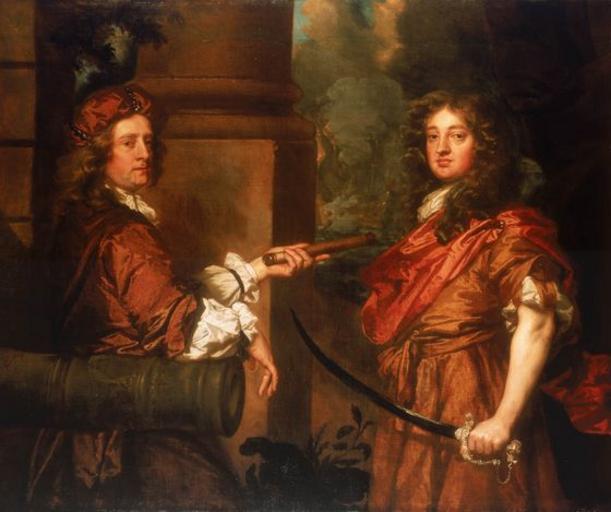MAKE A MEME
View Large Image

| View Original: | Freschville_Holles_(Right)_and_Robert_Holmes.jpg (560x469) | |||
| Download: | Original | Medium | Small | Thumb |
| Courtesy of: | www.flickr.com | More Like This | ||
| Keywords: Holles was a gentleman-captain. Son of the antiquary Gervase Holles. Commissioned in the navy during the Second Dutch War and lost an arm in the Four Days Fight. Knighted 1666 and MP for Grimsby, 1667 where he was critical of the Navy Board; he commanded the Henrietta (1666) and the Cambridge (1672). Holles was killed in action at Sole Bay and was buried in Westminster Abbey. Sir Robert Holmes (ca. 1622 – 18 November 1692) was a British Admiral of the Restoration Navy. He took part in the second and third Anglo-Dutch wars, both of which he is, by some, credited with having started. He was made governor of the Isle of Wight, where he is buried in Yarmouth parish church. Holmes is chiefly remembered for his exploits on the cruise to Guinea (1664) for the Royal African Company, and for the so-called Holmes's Bonfire of 1666. He is regarded as an archetypal figure both of the quarrelsome restoration officer and of the coming into being of the British professional naval officer. Holles was a gentleman-captain. Son of the antiquary Gervase Holles. Commissioned in the navy during the Second Dutch War and lost an arm in the Four Days Fight. Knighted 1666 and MP for Grimsby, 1667 where he was critical of the Navy Board; he commanded the Henrietta (1666) and the Cambridge (1672). Holles was killed in action at Sole Bay and was buried in Westminster Abbey. Sir Robert Holmes (ca. 1622 – 18 November 1692) was a British Admiral of the Restoration Navy. He took part in the second and third Anglo-Dutch wars, both of which he is, by some, credited with having started. He was made governor of the Isle of Wight, where he is buried in Yarmouth parish church. Holmes is chiefly remembered for his exploits on the cruise to Guinea (1664) for the Royal African Company, and for the so-called Holmes's Bonfire of 1666. He is regarded as an archetypal figure both of the quarrelsome restoration officer and of the coming into being of the British professional naval officer. | ||||